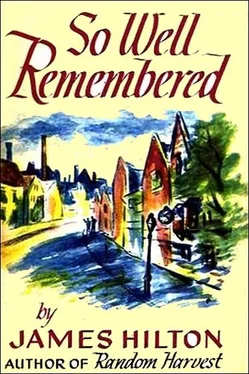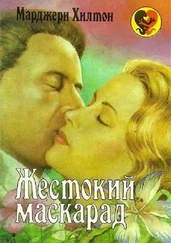Джеймс Хилтон - So Well Remembered
Здесь есть возможность читать онлайн «Джеймс Хилтон - So Well Remembered» весь текст электронной книги совершенно бесплатно (целиком полную версию без сокращений). В некоторых случаях можно слушать аудио, скачать через торрент в формате fb2 и присутствует краткое содержание. Год выпуска: 1945, Жанр: Проза, на английском языке. Описание произведения, (предисловие) а так же отзывы посетителей доступны на портале библиотеки ЛибКат.
- Название:So Well Remembered
- Автор:
- Жанр:
- Год:1945
- ISBN:нет данных
- Рейтинг книги:5 / 5. Голосов: 1
-
Избранное:Добавить в избранное
- Отзывы:
-
Ваша оценка:
- 100
- 1
- 2
- 3
- 4
- 5
So Well Remembered: краткое содержание, описание и аннотация
Предлагаем к чтению аннотацию, описание, краткое содержание или предисловие (зависит от того, что написал сам автор книги «So Well Remembered»). Если вы не нашли необходимую информацию о книге — напишите в комментариях, мы постараемся отыскать её.
So Well Remembered — читать онлайн бесплатно полную книгу (весь текст) целиком
Ниже представлен текст книги, разбитый по страницам. Система сохранения места последней прочитанной страницы, позволяет с удобством читать онлайн бесплатно книгу «So Well Remembered», без необходимости каждый раз заново искать на чём Вы остановились. Поставьте закладку, и сможете в любой момент перейти на страницу, на которой закончили чтение.
Интервал:
Закладка:
“The animals would have a good time if everybody was in prison,” Livia commented cheerfully. “THEY aren’t guilty, anyhow. In fact they don’t know anything about our wars and peaces—how can they? What does it matter to a worm whether he gets cut in half by a garden spade or by a shell bursting?”
He smiled. “It would certainly be hard to convince him of the difference. Probably about as hard as to explain to Man the mind of God.” He turned with her into the clough. “By the way, I’m going to London for a few days. Anything you’d like me to get for you there?”
“Can’t I come with you?”
“Wouldn’t be much fun for you. It’s—it’s mostly a business trip.”
“You mean—you’re going to—to start doing financial things again?” That was the nearest she ever came to a direct question.
“Good God, no. Don’t you think I had enough?” That was the nearest he ever came to a direct answer.
While he was gone she realized she was enjoying even the loneliness, because of the image of his return. That image hovered over the edge of every page of every book she turned to, was called to life by every loved gramophone record. Her eighteenth birthday came during his absence, and somehow she was not even disappointed that he had chosen to be away at such a time; maybe he had had no choice; there were still many things in his life of which she knew nothing. The long interval of the prison years, for instance. He never even hinted at them, yet—she argued—what else could have caused the disconnection between the kind of person he had been and the kind he now was? Some day, perhaps, he would tell her about that also. Some day, when she was old enough, he would think of her as a complete adult, within range of every possible adult confidence. She already felt she was, however little it might have occurred to him so far. She was also beginning to appraise herself physically, though without vanity, for she considered her body too small and her mouth too big; but in being thus ruthless she was merely, of course, denying herself what she did not want. She knew no boys or young men, and when sometimes in Browdley they would stare at her as if she attracted them, she herself was aware only of disinterest. She did not want —was sure she would never want—to attract anyone that way. There were other ways for which she felt herself far better equipped; she liked to think there was something rare and talismanic about her that could appeal to an older man.
Yet she must not dramatize; he had once cautioned her about that, and ever afterwards she had known she had better not act before him; and this, by a subtle transition, meant that she need not act before him, thus (if she chose to look at it that way) relieving her of a burden rather than imposing on her a restriction. It was pleasant, anyhow, to think of the future that stretched ahead; she and Martin at Stoneclough, pottering about the garden, taking walks in the clough and on the moorland, visiting places together—the eventless days, the long firelit evenings. And, of course, to complete such felicity, the war would end sometime.
Sarah, growing deafer and more asthmatic in her old age, seized the chance of Martin’s absence to urge her to ‘get out’ oftener, to make friends with young people, to enjoy herself more. And this, from Sarah, who had always connected ‘enjoyment’ with the Devil, was an amazing suggestion if Livia had been interested enough to think about it.
But she merely replied, off-handedly as she always did to Sarah: “I DO enjoy myself. I’m perfectly happy.”
“It’s a pity you gave up school,” said Sarah.
“Well, I never enjoyed myself much there, anyhow. And besides, I didn’t give it up—the school gave me up. Didn’t you know that? I was practically expelled, and then other schools wouldn’t have me—Martin didn’t tell me that, but I once saw some letters on his desk saying they couldn’t take me… I knew why even if HE didn’t… You see, I’m a bad lot—like father, like daughter—isn’t that rather natural?”
She knew, of course, that she was acting then; she was always ready to do so in order to shock old Sarah.
When Martin came back she had been waiting for him for hours, but without urgency. Snow had fallen during the day, and this presumably had made his train late. It had also covered the drive as far as the road so thickly that Watson could not clear it in time to take the car to the station; so Martin would doubtless arrive by taxi. Earlier in the evening she had put on galoshes to enjoy the garden, where the snow lay piled in knee-high drifts —a rare enough sight to be novel, and so were the white slopes of the clough, through which the path ran untraceably except to one as familiar with it as she. The sky was blue-black and full of stars; they and the snow made a paleness bright enough to read by. And all around, especially when she listened for any car noise, there was a great blanket of silence that seemed to follow her into the house when she re-entered.
He arrived about ten o’clock, having walked the last mile along the road because the taxi couldn’t get any further.
“And with those thin shoes, Martin? You must be soaking wet… And carrying that bag all the way…”
“It’s not heavy. I’ll go up and change immediately.”
“Let me carry it for you.”
“No, no… I’m all right. If I want anything I’ll ring for Sarah.”
“She’s got a bad cough and went to bed hours ago.”
“All right… I won’t want anything.”
By the time he came down she had the drawing-room fire roaring high, and a tray of refreshments by the side of his favourite armchair—hot soup, sandwiches, whisky and soda.
“Nice of you, Livia, but really and truly I don’t want anything— except the fire.”
“But I’m sure you didn’t have any dinner—”
“I managed all right. Don’t worry about me. PLEASE don’t worry about me.”
The way he said that made her instantly begin to do so. She noticed how more than usually tired he looked, his whole face drawn a little, hands trembling as he held them to the fire.
“When you were so late I wondered if perhaps you weren’t coming back till tomorrow.”
“No… it was just the weather.”
“I thought perhaps your business had taken longer than you expected.”
“No… there wasn’t much business.” His face lightened as he added: “I didn’t forget your birthday, but—I have an awful confession—I left what I bought you in the train. They were some special records— of Mozart. I knew you’d like them. I don’t know how I could have been so stupid, but it’s quite possible they’ll be turned in by the finder. Unless he’s so disappointed when he unwraps the parcel that he smashes them in disgust.”
“Oh no—NOBODY could deliberately smash Mozart records!”
He smiled. “Maybe not. Anyhow, I left word about it—and if we don’t get them back I’ll buy you some more.”
“Martin… I’m so sorry… don’t worry about it.”
“Who said I was worrying about it?”
“Well, you’re worrying about something—I can see from your face.”
“I told YOU not to worry.”
Suddenly, leaning forward to warm his hands, he slipped and fell to his knees. Only her nearness and quickness saved him; another few inches, another second, and he would have been burned. As it was, she managed to pull him back and saw then that it had been more than a slip, more than just tiredness. She was calm, yet uncertain what to do—call Sarah?— call a doctor?—but first, anyhow, there was the whisky. She forced a stiff drink between his lips, then began loosening his collar. While she was doing this his eyes re- focussed themselves.
Читать дальшеИнтервал:
Закладка:
Похожие книги на «So Well Remembered»
Представляем Вашему вниманию похожие книги на «So Well Remembered» списком для выбора. Мы отобрали схожую по названию и смыслу литературу в надежде предоставить читателям больше вариантов отыскать новые, интересные, ещё непрочитанные произведения.
Обсуждение, отзывы о книге «So Well Remembered» и просто собственные мнения читателей. Оставьте ваши комментарии, напишите, что Вы думаете о произведении, его смысле или главных героях. Укажите что конкретно понравилось, а что нет, и почему Вы так считаете.










